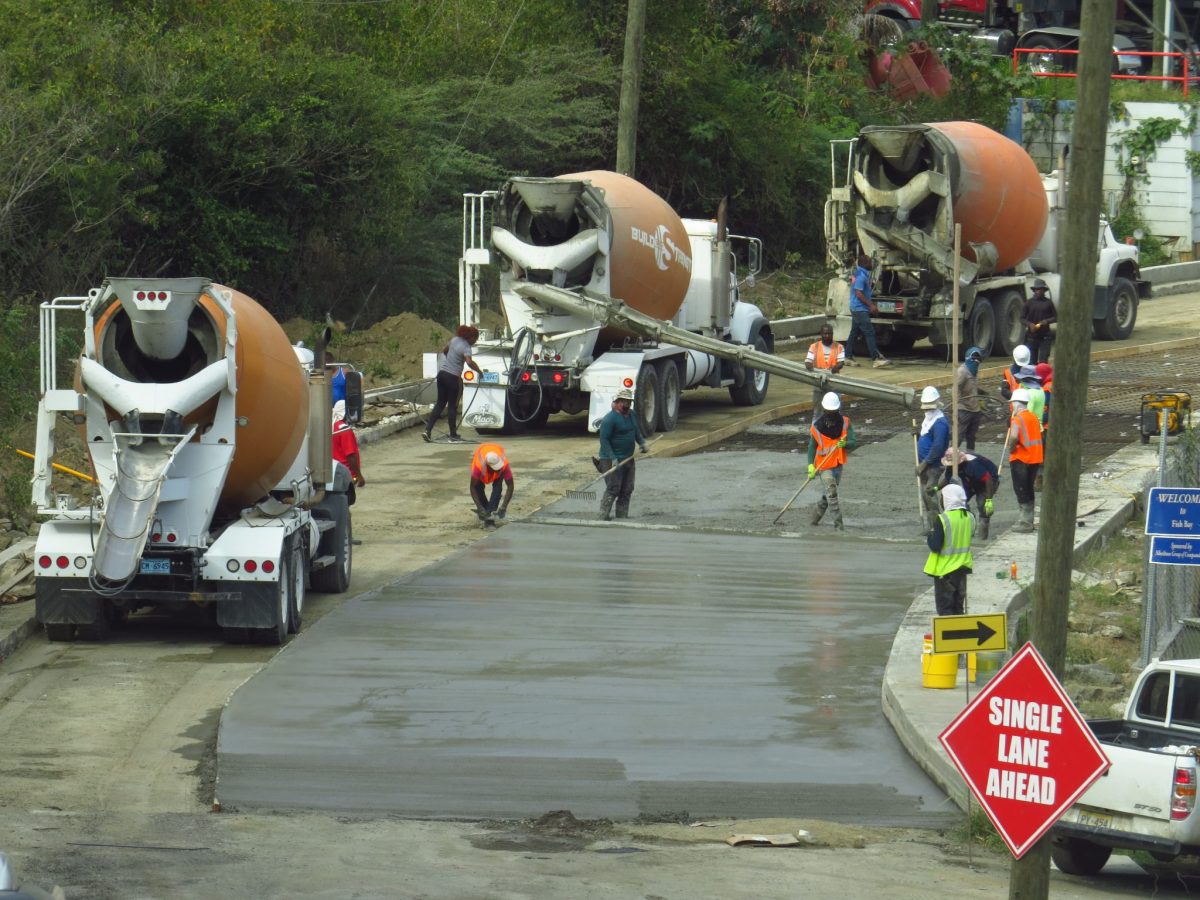

The government tendered fewer than half of the major contracts it awarded between 2019 and 2022, and it often passed over the lowest offer for the rest, according to a recent report from Auditor General Sonia Webster.
Such poor procurement practices — which also included frequent contract-splitting and a system that allowed certain contractors to dominate the market — likely prevented taxpayers from getting the best value for more than $173 million spent on roadwork, water-and-sewerage repairs, and many other public projects during the four-year period, Ms. Webster found. To address such issues, the report lists 10 recommendations, calling for government to use best practices to urgently address the territory’s crumbling infrastructure and “prevent the occurrence or appearance of conflict of interest, related-party transactions, or other affiliate relations that could compromise the contract award.”
‘Flawed’ framework
The audit, which covered a period mostly before a new procurement law and regulations took effect in September 2022, was laid on the table of the House of Assembly on Sept. 3 and circulated Friday by Governor Daniel Pruce along with four other audits that probed pandemic stimulus programmes (see sidebar below).
“The audit of major contracts found that the previous procurement framework was ‘inherently flawed’ as it ‘allowed for circumvention,’” Mr. Pruce said in a statement when he released the reports. “The audit identified the ‘need for balance and equity in the award of public contracts.’”
The governor also cited the auditor general’s finding that new procurement rules address many of the issues she found but that “adequate oversight and strict compliance” are needed moving forward.
“Crucially, in some areas, lessons have already been learned,” Mr. Pruce said, adding, “There have been improvements in the way government contracts are issued, and procurements are now regularly advertised.”
COI recommendation
The 102-page report was carried out pursuant to a Commission of Inquiry recommendation that called for an audit of all contracts for projects “valued at over $100,000, even if they have been the subject of contract splitting or sequential contracts,” from 2019 to 2022.
“The objectives of this audit, based on the Commission of Inquiry recommendation B18, are to identify weaknesses in the contract process that allows for the manipulation of a project to avoid the open tender requirements, instances of waiver of the open tender process, deficiencies in the selection of contractors, verifying project completion and value for money,” the report stated.
Crunching the numbers
Of the $173.5 million in public contracts awarded during the time period reviewed, $115.1 million went to major contracts worth more than $100,000; $56 million were petty contracts worth $100,000 or less; and $2.4 million were work orders, according to the auditor general’s report.
At the time, Cabinet had the authority to waive the tender process for a contract valued above $100,000 for reasons including “emergency scenarios;” “exceptional circumstances,” the hiring of certain consultants for “amounts up to $550,000” under the Caribbean Development Bank recovery loan; and the hiring of ministerial political advisors, according to the auditor general.
During the four-year timeframe reviewed, Cabinet tendered 72 major contracts worth $48.7 million, and it waived the tender process for 105 other contracts worth $65.7 million. The remaining contracts — which made up about half of one percent of the total and were valued at $618,197 — were neither tendered nor waived, according to the report.
“The projects most likely to be tendered were those associated with major construction projects (construction of buildings, schools, community centres, social homes, etc.) or large-volume asset purchases (vehicles, furniture, equipment, etc.),” the report stated. “Among the least likely to be tendered were consultants, infrastructure projects (roads, retaining walls, etc.), and information technology contracts.”
In “several” instances, Cabinet papers did not provide a reason for waiving the tender process, the auditor found.
“Instead, the text implied an unanticipated or immediate need or indicated an exceptional resource but did not suggest why others should not be invited for consideration,” the report stated.
‘Lack of planning’
When Cabinet did explain its reasons for waivers, they included urgency, single source or niche services, pandemic or other emergency factors, or a desire to continue with an original supplier or service, among others.
“Urgency” was the reason that was used the most, covering about 41 percent of the waived tenders.
“In effect, the government’s lack of planning and foresight led to ‘urgent’ commitments which had significant ongoing financial implications,” the report stated.
Because of this finding, the auditor general recommended limiting the use of this excuse.
“Better planning is required to reduce the high incidence of ‘urgent’ procurement,” she wrote. “This is particularly the case for goods and services that have potential for long-term cost implications and vendor lock-in. An assessment should be made of some of the ongoing weighty commitments that are continuously renewed, with a view to determining whether better value could be had outside of the already sunk costs.”
Lowest bid, no contract
Of the major contracts that were tendered, eight were awarded to single bidders; five had been “tendered in the prior year, and another five were from restricted tenders;” and the auditor general received no information on tenders for 10 projects, which were mostly related to solid-waste collection, the report stated.
Of the 43 remaining tendered contracts, only about 40 percent went to the lowest bidder.
While the report acknowledged “many valid reasons for rejecting the lowest tender,” it also noted circumstances where the lowest bidder lost to higher bidders even though both submissions received similar overall assessment scores from the Central Tenders Board. Ms. Webster used a contract for a new social home as an example.
“The lowest tender scored 86.7 and ranked second,” the report stated. “The contract was awarded to the company with the highest assessment score of 89.7, which resulted in an increased contract cost of $10,279.”
The number of lowest bidders that were rejected was also problematic, according to the report.
“The high incidence of lowest tender rejection signals a lack of confidence in the ability of developing contractors to meet project requirements,” the report stated in the “recommendations” section. “The procuring entity should balance this scepticism with a fair evaluation of the tender submissions in order to support contractor development and widen the pool of local contractors available for public awards.”
‘Market dominance’
The auditor general also found a “clustering of awards to the same contractors,” especially with projects involving the Recovery and Development Agency.
“This promotes a pooling of expertise and wealth and retards development for others who are shut out from receiving public contracts,” the report stated.
It also included a recommendation to address this issue.
“An effort should be made to avoid the pooling of awards to the same contractors,” Ms. Webster advised. “While it is essential that the government seeks to achieve the best value for money on resources, it is also essential to avoid a government-created market dominance that stifles other participants.”
The report also examined contract splitting, which it said occurs “when a government office divides a large project into smaller parts which are costed below the $100,000 threshold to allow for contract award outside of tendering.”
Though contract splitting was practised during 2019 to 2022, it happened at a “reduced extent” from previous years, according to the report.
Much of the splitting that did occur, the auditor explained, came under an emergency-procurement policy that Cabinet approved amid the Covid-19 pandemic in mid-2020.
“Unfortunately,” she added, the splitting occurred “without full adherence to the policy’s stipulated requirements or observance of its intent.”
Sewage work is carried out in East End in 2022. A recent report by the auditor general found that the territory’s water and sewerage system has likely suffered because of poor procurement practices. (File photo: ZARRIN TASNIM AHMED)
Water and sewerage
The report also detailed some of the ramifications of poor procurement practices. Between 2019 and 2022, Ms. Webster noted, the central government and the RDA awarded more than $12 million in the form of major contracts, petty contracts and work orders for work on water-and-sewerage infrastructure.
“Despite these efforts, the government fails to provide a reliable source of water to residents territory-wide,” she stated. “Some areas are deprived of public water for days.”
To address such issues, the report called for a “territory-wide assessment of the water-and-sewerage infrastructure, followed with a programme to implement” all recommended repairs.
“The Ministry [of Communications and Works] must develop a sustainable water management plan that takes into account population growth and environmental factors,” Ms. Webster added. “It is beyond unsatisfactory that the government is unable to provide this basic service.”
Roads in disrepair
Roads also remain in “disrepair” despite the central government and RDA awarding about $20 million in the form of major contracts, petty contracts and work orders to repair them during the four-year period, according to the auditor.
“Road surfaces are routinely undermined by heavy rainfall and flash flooding, indicating an innate vulnerability in the face of worsening climate conditions,” the report stated. “During these events, chunks of asphalt are sometimes dislodged from the road base and transported by the flowing water, resulting in unsafe driving conditions.”
The poor state of the roads was the focus of the report’s final recommendation.
“The deteriorating road system demands a comprehensive strategy that integrates resilient construction, routine maintenance, and erosion control practices,” the report stated. “The government should enlist an experienced engineer specialising in resilient infrastructure design to perform an assessment and recommend upgrades. While resilient materials like foamed bitumen have higher initial costs, they require less ongoing maintenance and can better withstand extreme weather conditions.”
The report also emphasised the importance of maintaining “oversight” and “strict compliance.”
“Without vigilant adherence across the central government and its statutory entities, there remains a risk that many of the same pitfalls could persist,” Ms. Webster wrote.
Reforms made
The auditor general also acknowledged that her review covered a period mostly before a new procurement law and regulations took effect in September 2022.
“The prior procurement framework offered guidance and structure, but it was inherently flawed,” she wrote. “It allowed for circumvention, thereby undermining the tenets of value for money, accountability, and impartiality.”
The recent reforms, however, may not have fully solved such problems.
“The new procurement legislation and regulations address many of the previous issues but also create some new opportunities for abuse,” the report stated. “Their effectiveness ultimately hinges on adequate oversight and strict compliance. Without vigilant adherence across the central government and its statutory entities, there remains a risk that many of the same pitfalls could persist.”
List of contracts
The report, which was initially completed on Aug. 2 and amended Aug. 26, also includes a list of contracts that were issued from 2019 to 2022.
Related News

Charges Announced in Murder of St. Croix Jeweler Kailash Banani

VI Consortium Announces 'Quarantine Jouvert', Set for May 2 From 4am-9am and Featuring Bi...

Schneider Hospital Extends Bill Amnesty Program Offering 50 Percent Savings for Patients

